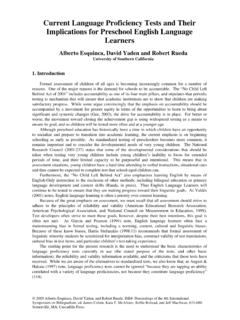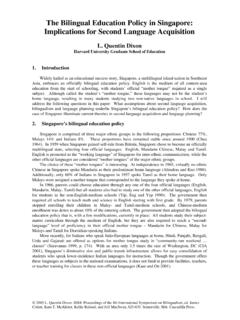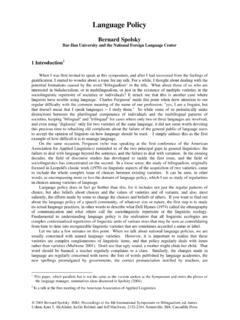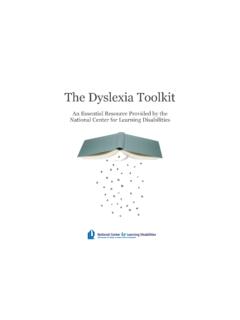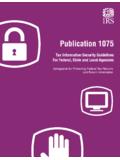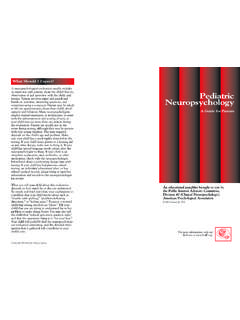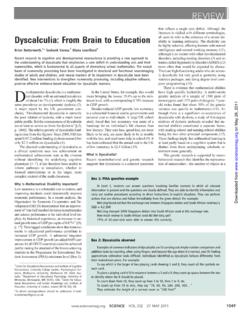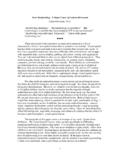Transcription of The Role of Syntax in Reading Comprehension: A …
1 The Role of Syntax in Reading comprehension : AStudy of Bilingual Readers Gita Martohardjono, Ricardo Otheguy, Alison Gabriele, Michele de Goeas-Malone, Malgosia Szupica-Pyrzanowski, Erika Troseth, Silvia Rivero, and Zoe SchutzmanGraduate Center, City University of New York 1. General introduction English language learners (ELLs) from Spanish speaking homes tend to have comparatively low literacy achievements as early as first grade and continue to lag behind their English speaking peers throughout the school years, even when instructed and assessed in Spanish (CTB/McGraw Hill, 1982, 1988; De la Rosa and Maw, 1990; Orfield, 1986). This lag in Reading skills manifested in the earlier grades is exacerbated at the middle school and high school levels when it is critical for students to understand and manipulate large volumes of written text to learn subject matter.
2 The cognitive prerequisites for successful Reading comprehension are already complex even when we consider this process for monolingual children Reading in their native language, particularly when they come from low income families. In a widely cited study, Chall and Jacobs (1996) reported that by the time these children reach fourth grade, their Reading scores begin to decrease and continue to do so for the next five years, a phenomenon that has been termed the fourth grade slump. For inner city bilingual and bidialectal children, learning to read is even more complex, as they have to negotiate two linguistic systems, acquire Reading skills in a language not spoken at home, and face the challenges of an overburdened public school system (NYT, March 28, 2002). In a report on the necessity of research on Reading comprehension (Snow 2002), the Rand Reading Study Group points out that in order to successfully negotiate textual meaning the reader must bring at least the following to the act of Reading : cognitive capabilities ( attention, memory), motivation ( purpose, interest), linguistic knowledge and experiences.
3 Yet educators do not understand these factors sufficiently, especially in the case of second language readers: ..the education field [does not] know how to limit the particular challenges that second language readers face due to those readers limited vocabulary and linguistic knowledge, nor do educators know how to build on those readers first language comprehension abilities. (pg. xiv) In this study, we look at the relationship between emerging language knowledge and Reading skills in the bilingual child. In particular, we investigate the role of the bilingual child s syntactic systems in the emergence of Reading readiness. Our focus is on Reading comprehension and more specifically its precursor skill, listening comprehension . The comprehension of written and aural text is an area of literacy development that has received relatively little attention, especially when compared to the investigation of decoding skills.
4 Gough and Tunmer (1986) and Tunmer and Hoover (1993) were among the first Reading theorists to identify two main areas of cognition that contribute to the ability to read and understand written text: decoding skills, consisting of the ability to identify speech sounds and link these to individual letters; and listening comprehension , which is based on the reader s ability to recruit her mental grammar of the language and process sentences. Since Syntax is a significant component in processing and at the same time a domain of language that Reading researchers are only beginning to investigate, we have made it the main focus of our study. In the following section we report some of the findings on the relationship between Syntax and developing Reading skills in monolingual children.
5 2005 Gita Martohardjono, Ricardo Otheguy, Alison Gabriele, Michele de Goeas-Malone, Malgosia Szupica-Pyrzanowski, Erika Troseth, Silvia Rivero, and Zoe Schutzman. ISB4: Proceedings of the 4th International Symposium on Bilingualism, ed. James Cohen, Kara T. McAlister, Kellie Rolstad, and Jeff MacSwan, 1522-1544. Somerville, MA: Cascadilla The relationship between Syntax and Reading Early studies targeting syntactic development in Reading impaired children suggest that Reading disabled children have deficiencies in their application as well as understanding of Syntax . Cromer and Wiener (1966) proposed that unskilled readers do not use Syntax to assist and help in decoding written material. Vogel (1975) demonstrated that Reading impaired children had deficits in areas measuring the Syntax of expressive language and found a significant correlation between productive Syntax scores and Reading comprehension scores, while Anderson (1982) revealed that poor readers exhibit syntactic deficiencies in the written language.
6 There are two approaches with respect to impaired readers and the source of their inferior performance. Researchers who associate poor readers difficulties with underlying phonological processing deficits (Crain and Shankweiler, 1988; Macaruso, Bar-Shalom, Crain and Shankweiler, 1989; Liberman and Shankweiler, 1985; Shankweiler and Crain, 1986; Shankweiler et al., 1995; Smith, Macaruso, Shankweiler and Crain, 1989) support the Processing Deficit Hypothesis (PDH). The PDH states that unskilled readers do not experience deficits in representing or processing syntactic information but do experience difficulty in processing and retaining phonological information in working memory. This deficiency occurring at the level of working memory keeps information from being delivered at the necessary pace and with the required precision for higher level processing.
7 For example, Shankweiler and Crain (1986) propose that difficulty in the processing of complex syntactic structures should be interpreted as difficulty at the phonological rather than the syntactic level. The Structural Deficit Hypothesis (SDH) attributes difficulties in the acquisition of Reading to syntactic processing deficiencies (Bentin, Deutsch and Liberman, 1990; Bowey, 1986a, 1986b; Menyuk et al., 1991; Scarborough, 1991; Stein, Cairns and Zurif, 1984). The SDH claims that an absence of grammatical knowledge or lack of processing ability interferes with higher level text comprehension . Under the SDH the acquisition of syntactic structures is staged and gradual with inherently simpler structures preceding more complex ones in language development.
8 It is the more complex structures that beginning and poor readers have more difficulty with. The criterion for the complexity of syntactic structure is based on the claim that one form or construction is simpler than another if children can produce and comprehend it first. For example, a sentence consisting of both a main clause and a subordinate clause such as The woman saw a man who ate a sandwich is considered more complex than a coordinate structure as in The woman saw a man and ate a sandwich, because the former comes later in acquisition than the latter. Investigation into the relationship between syntactic processing and syntactic knowledge has also included normal populations classified into good and poor readers (Bentin, Deutsch and Liberman, 1990; Bowey, 1986a, 1986b; Byrne, 1981a, 1981b; Menyuk et al.)
9 1991; Scarborough, 1998; Stein, Cairns, and Zurif, 1984, Waltzman and Cairns, 2000). Bentin et al. (1990) identified syntactic differences between good and poor readers. In a three experiment study they sought to examine the relationship between Reading ability and syntactic awareness in children (native speakers of Hebrew) who differ in Reading competence. Unlike the vast majority of previous studies, auditory rather than written stimuli were used. The groups consisted of severely Reading impaired children and unimpaired good and poor readers in the fourth grade. The results indicate that the difference between the correct identification of syntactically deviant and syntactically accurate sentences was smaller in the group of children with severe Reading disability than in either good readers or relatively poor readers.
10 Good as well as poor readers performed better than the Reading disabled children in the judgement task. According to Bentin et al. this apparent inferiority of the latter group cannot be explained only by a reduction of the participants short term memory span since first, very short and simple sentences (three or four words) were used; second, when tested formally all the children repeated sentences verbatim without any problem; and third, the nature of the stimuli in question did not involve the manipulation of subtle syntactic aspects but rather included straightforward syntactic violations of the subject predicate relation and word order. They argue that inadequate phonological processing does not justify and explain all aspects of poor Reading since in their study poor readers were nevertheless good decoders.
